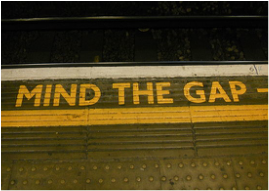\hī-ˈā-təs\
A cosmopolitan friend of mine recently observed that Americans seem unusually fond of the word “hiatus.” In other English-speaking places, she said, it is a specialized, rather formal term. In the US, though, people use it all the time, even in casual conversation.
I’ve been mulling this over ever since. Why, I wonder, did we Americans embrace “hiatus” so enthusiastically?
I think it might be related to our work culture. Americans uphold the importance of being a good worker and productive citizen to such an extent that we find it difficult to conceive of human value in any other way. We lionize the companies that demand 80 hour workweeks and the go-getters who throw all their energy into their startup. We are still arguing over whether workers should get sick days or paid parental leave (pay people to NOT work???). We are encouraged to monetize all the spare crannies of our lives—to Uber and Airbnb and TaskRabbit our way to total economic engagement 24/7.
So of course we choose our words carefully when we describe the time when a task is NOT getting done. Consider some of the alternatives:
There is, of course, vacation. It comes from Latin vacāre (to empty out), which is also connected to “vacate,” “vaunt,” and “evanesce.” A vacation is an empty space in a busy life, free from work and other obligations. Nice work if you can get it, but this emptiness seems to freak us out. Many of those Americans fortunate enough to get paid vacation don’t make use of it—either they or their employers cannot deal with the void at its heart.
There is the sabbatical. This one comes from the Latin sabbaticus and the Greek σαββατικός, which refer to the Sabbath or day of rest (the Hebrew root shābath means “to rest”). The term originally referred to Mosaic law, in which every seventh year the land was to remain untilled and debtors and slaves released. Now, however, far from leaving the fields untilled, a sabbatical implies that useful work is taking place during the gap and that you’ll come back having written a book.
There are others: you might be on leave, or on break. There might be an intermission. A time out. Recess. Or you could be off. Like a switch or an elderly quart of milk.
Hiatus, though, foregrounds the work, not the worker. Activity simply stops, to be resumed at some later date. And the worker, meanwhile, can quietly disappear between the lines, free of unfortunate insinuations of illness, laziness, or (god forbid) recreation. In that space she might be productive or she might not. She might gape. She might yawn. No one will know. It's quite subversive really.
Mind the gap.


 RSS Feed
RSS Feed